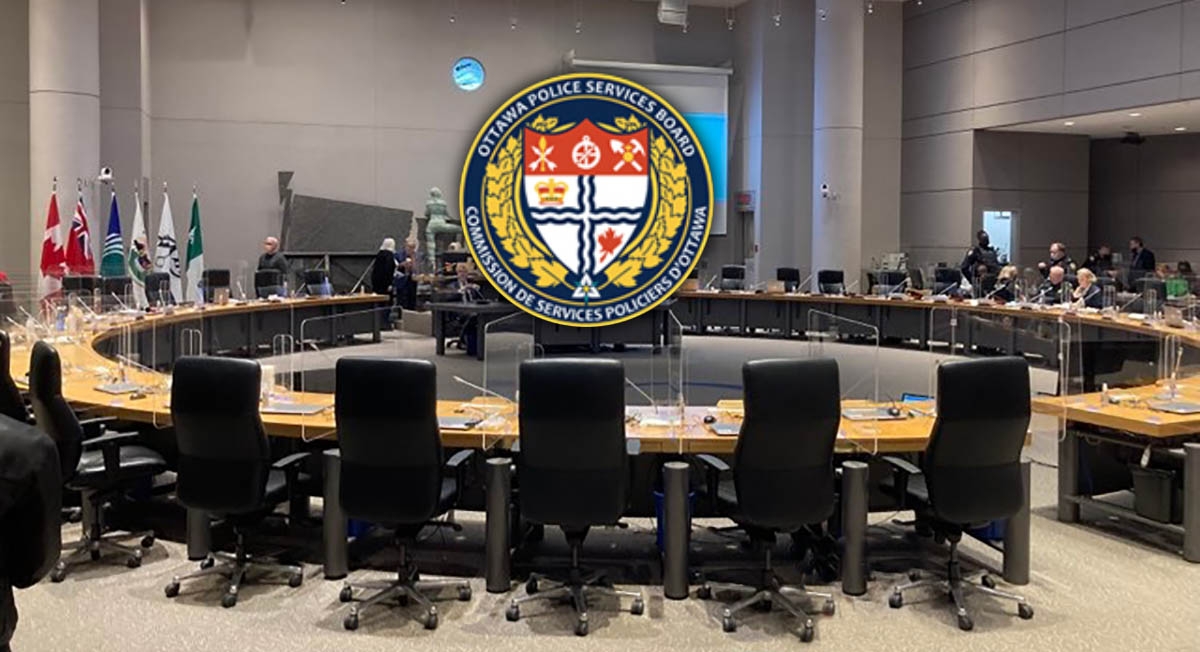
The OPS presents the Ottawa Police Services Board with a plan to change policing and improve community safety
Monday’s meeting of the Ottawa Police Services Board (OPSB) began with delegate Liz Venczel, a criminology PhD student at the University of Ottawa, claiming that the proposed higher police presence in the ByWard Market and the new police operations centre that is due to open at the Rideau Centre would contribute to more policing, “surveil, harass, arrest and harm racialized people, unhoused folks, people with mental health and substance use challenges, and other marginalized communities.”
Venczel voiced concern against “hot-spot policing” and “community partnerships.” She called hot-spot policing “one of the most problematic policing strategies”, stating there is “plenty of research” to back up this claim and said “predictive policing algorithms are racist.” Venczel says it needs to be “dismantled” because it relies on crime statistics that point to targeted policing, which is discriminatory.
She went on to say that the new police centre proposed for the ByWard Market is a “violation of human rights.” Board members, including Mayor Sutcliffe, Chair Salim Fakirani, and Chief Eric Stubbs, did not respond to Venczel’s delegation.
Following her presentation, delegate Jeffrey Bradley addressed the OPSB, iterating similar points. He stated that an augmented police presence in the market will lead to the harassment of marginalized groups and will hurt community safety.
Bradley called the proposed strategy the textbook definition of “state violence used to drive a larger gap between the wealthy and the poor.” Bradley also said that it was using “colonial laws to summon certain types of people to death and hopelessness.”
The board largely ignored Bradley’s presentation and did not respond to his delegation. During the proceedings, the radical group Criminalization and Punishment Education Project, which believes in abolishing prisons and defunding law enforcement, posted on X that the delegates were members of their organization.
The delegates’ presentations were in sharp contrast to the position of ByWard Market merchants, who, since 2021, have pleaded with the City of Ottawa to respond to crime and drug use in the historic Ottawa neighbourhood. The business owners have organized multiple meetings with police and city officials to air their grievances and safety concerns and push for a resolution.
The District Revitalization Project presented to the OPSB directly addresses the merchants’ concerns.
Police Superintendent Kevin Maloney stated that the new plan has been in the works since September 2022 and focuses on creating effective police services to provide better community policing across four separate districts in the city. The strategy involved is currently in development, but according to Maloney, it is close to completion. The Ottawa Police Service (OPS) will launch the District Revitalization strategy in January 2026.
The OPS reiterated that community policing is not a new strategy and follows four principles:
1. Act— to address public concerns holistically.
2. Account— improve transparency and accountability.
3. Access—allow constant channels with the OPS and the community.
4. Affect—creating partnerships within the community.
The District Revitalization Project will rely on a tailored policing response that is risk-focused with local deployment to focus on the specific cultural geography of the area and the community’s needs while also being culturally responsive.
Maloney reiterated that part of the focus is on strong community partnerships, which include shared responsibility for community safety, a holistic approach to alternative response, and the OPS being more accessible and transparent with the public.
Councillor Marty Carr asked the board why the community policing model in place in 2017 was dismantled and asked what the significant differences in strategy are aside from being a six-district, not four-district mode. Maloney commented that after 2017, “we went from a neighbourhood deployment to a very general deployment,” where it was determined that not all the moves taken by the OPS “were all right.” He further stated that the new model for community policing is based on feedback received since 2017.
Chief Eric Stubbs said that the OPS is cash-strapped but that the model has a three-year stabilization plan to aggressively fill gaps in the OPS that will be needed for the new strategy. Stubbs endorsed the plan, saying, “Really (it) is the people that are in specific areas working differently that’s the major change.”
Stubbs pointed out that the targeted policing strategy will require more time and investment from the OPS but will help with stabilizing the service offered by the police force, citing community policing in areas like Carp and Orleans to make the OPS more effective in how it delivers neighbourhood-based community policing that will save resources in the long term.
Board Member Cathy Curry asked if the OPS had spoken to or looked at the Longueuil, Quebec, police force and its successful community policing initiative by then-Chief Fady Dagher, who has moved on to be the head of the Montreal Police Service.
Maloney specified that they had looked internationally and domestically at community policing strategies but did not know if they had looked at Longueuil specifically. Stubbs chipped in that he had spoken to Dagher and would “adopt some of the principals” but pointed out that due to Ottawa’s large rural areas, it is a “different world, but there are some things we can take away.”
The meeting concluded after about two hours and fifteen minutes. The next regular meeting of the Police Services Board is scheduled for May 27, 2024.











